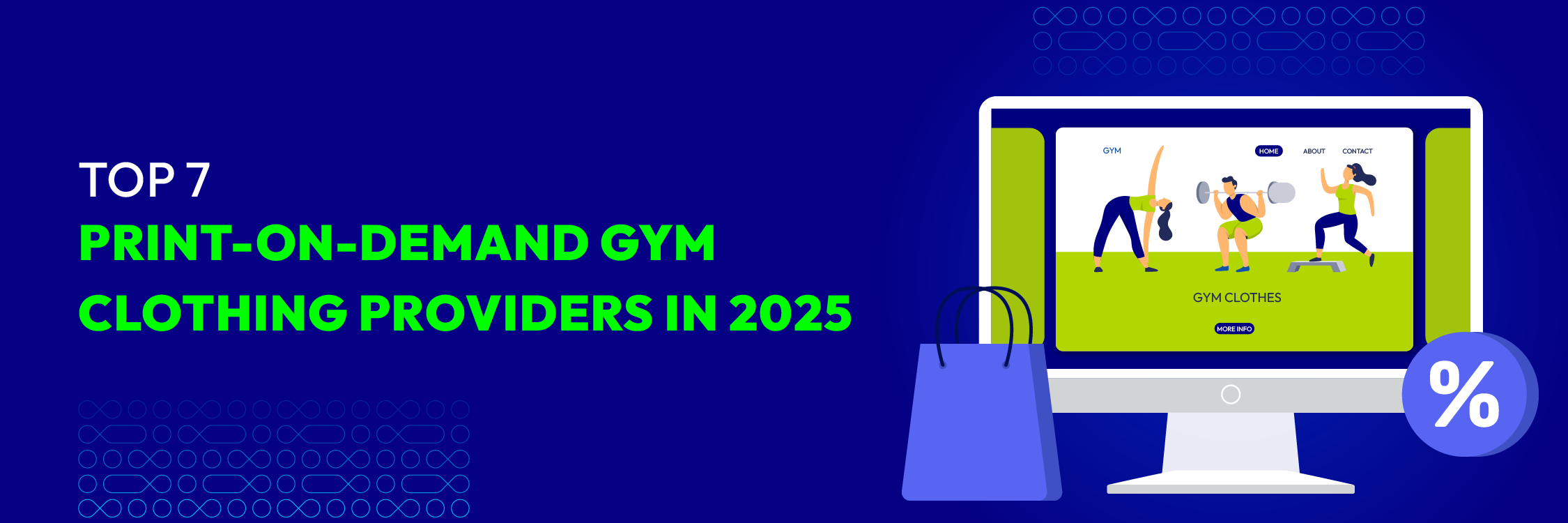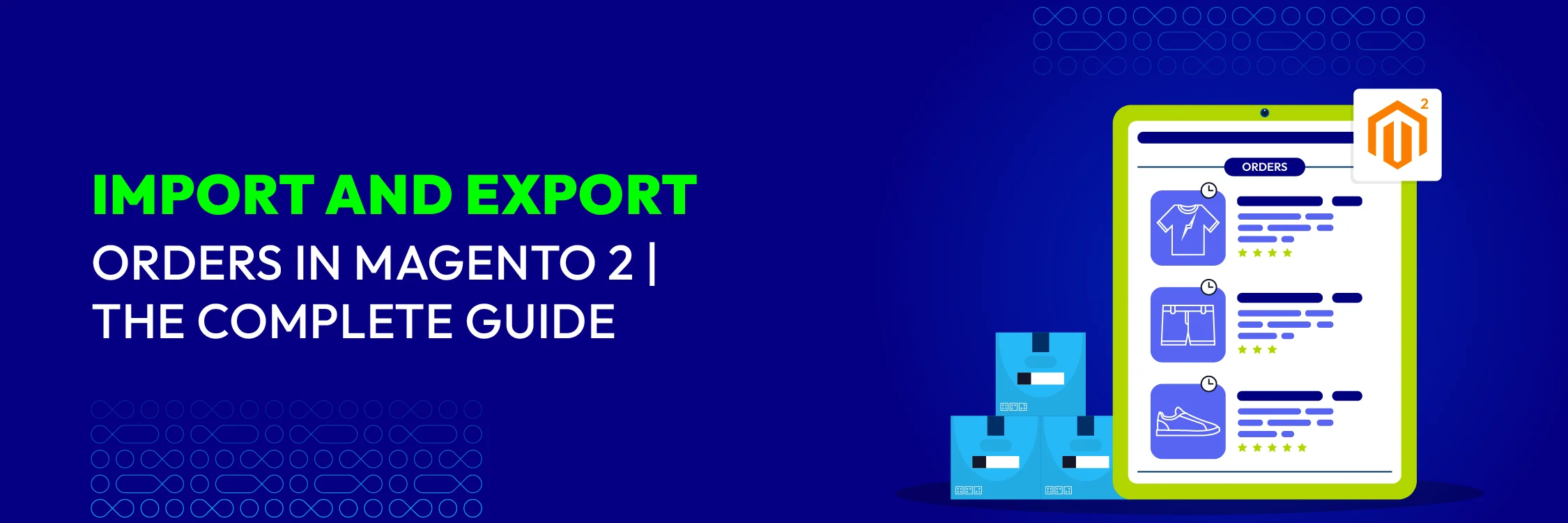What are Product Recommendation Engines?
Summer Nguyen | 12-18-2024

What are Product Recommendation Engines?
Product Recommendation Engines are not unfamiliar to almost all online merchants. These engines are designed to maximize the effectiveness of selling activities online. If you are new to e-commerce market, this blog will give you an overview of functions and advantages of product recommendation engines.
What is a recommendation engine?
If you often visit an online store and search for any item, you undoubtedly experience a chain of recommended products featured on the result page of your search product at least once. This list is the work of product recommendation engines.
Product recommendation engines are filtering tools that automatically recommend relevant products to every user to increase their demand to purchase as many items as possible. In other words, these engines are automated to make the best of algorithms in search engines and data collected to analyze and figure out the most appropriate suggestions for each individual. By applying product recommendation engines, store consumers will receive a bundle of related products besides the results for the product they want to look for. These listed suggestions are possibly also bought by customers or at least force web browsers to find more information about these items.
The appearance of possibly-purchase products is convenient for both store owners and online buyers. While shop admins will have chances to introduce more products, shopping doers do not need to waste their time finding products that match their interests and tastes.
How do product recommendation engines work?
Recommendation engines collect data on your interactions with the platform and use complex algorithms to identify patterns and relationships in your data, to predict what you might be interested in.
Collaborative filtering is one such algorithm that compares your profile with others who have similar tastes and suggests items based on what they’ve liked. If collaborative filtering isn’t enough, the engine looks at the actual characteristics of the products you’ve interacted with and matches features like categories, keywords, or descriptions to recommend items with similar attributes. These recommendation engines get smarter as you continue to interact with the platform and use machine learning to adapt and improve their predictions over time.
The engine continuously updates its recommendations in real time, ensuring that it reflects your current interests and trends. The engine takes note of your purchases and feedback, learning from your choices and fine-tuning its suggestions to align more closely with what you actually want.
Classify different types of recommendation engines
There are three types of recommendation engines used to generate recommendations for every online customer, which are collaborative, content-based, and hybrid recommendation systems.
Collaborative filtering:

This approach of recommendation engines makes use of information collected through the shopping behaviors of customers such as kind of product they look for, their interests, and their preferences. All information will be gathered and analyzed to classify consumers into a particular group. As a result, a list of might-like products will be predicted and sent to web browsers, so that they can easily take into consideration.
Strengths
- Captures serendipitous discoveries, recommending unexpected but potentially interesting products.
- Works well for diverse product catalogs and cold-start problems (lack of user data).
Weaknesses
- Can suffer from “echo chambers” if recommendations reinforce existing trends, limiting exposure to new products.
- Relies heavily on the quality and quantity of user data.
Content-based filtering:
This method focuses on customer data collected about their profile and products they already purchased. In other words, keywords are used to analyze the preferences of the consumer as people search for their preferred products via keywords. It means that, the more you visit and purchase goods at an online store, the better suggestions they can offer to you. Hence, a series of similar products will be presented based on previous preferences and shopping activities.
Strengths
- Provides personalized recommendations even with limited user data.
- Effective for niche products with distinct features.
Weaknesses
- Can lead to predictable and repetitive recommendations.
- Struggles with new or complex products that lack sufficient descriptive data.
Hybrid Recommender Systems

This approach in short is the combination of two methods above: collaborative filtering and content-based filtering. These two methods process separately then their results will be combined to optimize the most appropriate answers for the question: what items do customers really desire to look for? As this method has all advantages from two components, it is considered the best choice for product recommendation engines.
Strengths
- Combines the strengths of both collaborative and content-based filtering for more accurate and diverse recommendations.
- Addresses cold-start problems by leveraging content-based filtering when user data is limited.
- Adapts to individual user preferences through collaborative filtering.
Weaknesses
- Requires a robust data infrastructure to manage and integrate different data sources effectively.
- Tuning and balancing the influence of each component is crucial to optimize performance.
Best Product Recommendation Engines
1. Involve.me
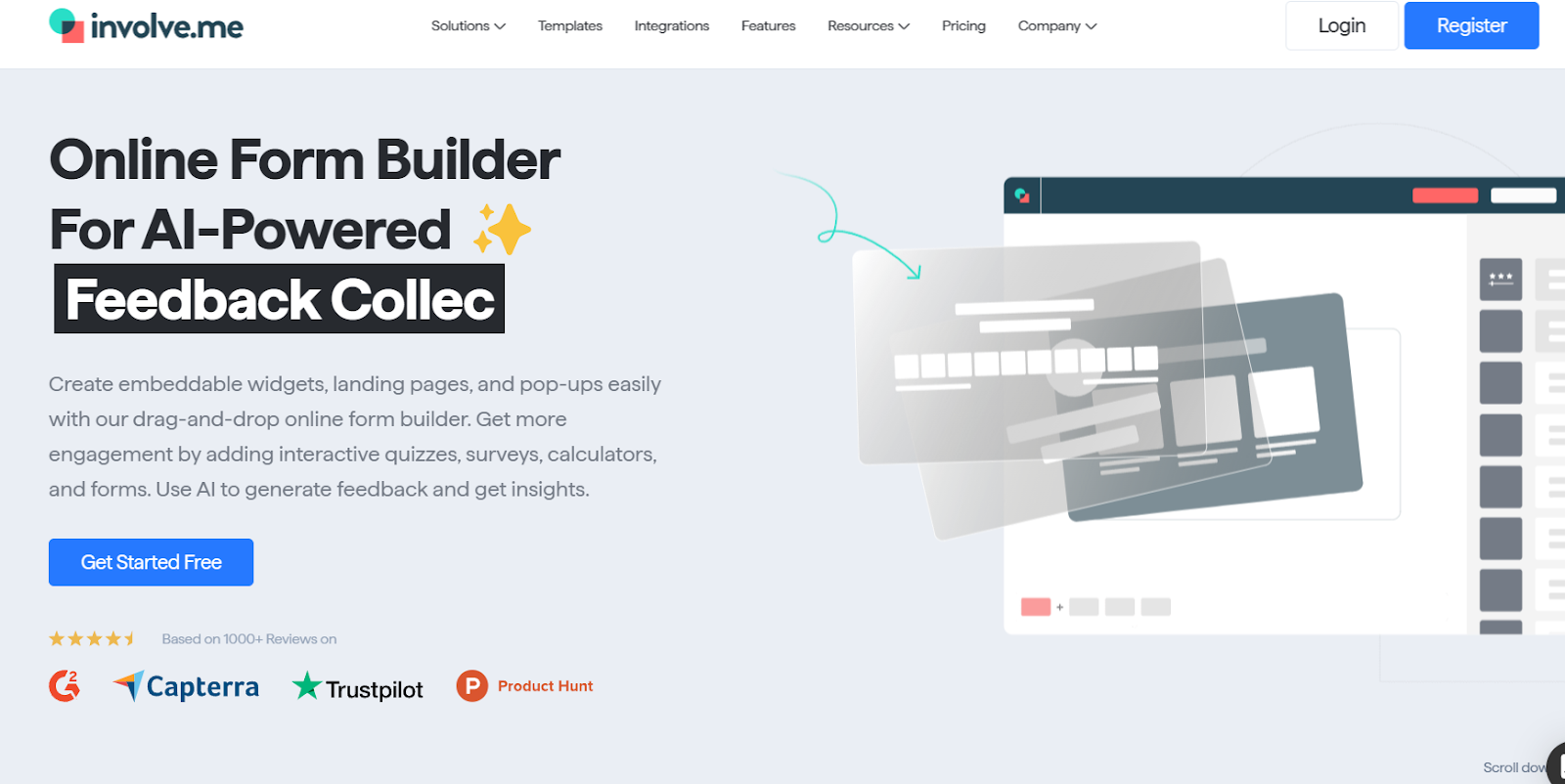
Involve.me breaks the mold of traditional product recommendation engines. While it still helps customers discover great products, it does so in a unique and engaging way, prioritizing interaction and understanding over algorithmic magic.
Think of it as a playground of quizzes, personality tests, and interactive games, all designed to guide customers toward their perfect match. Imagine a “What’s your skincare routine?” quiz that recommends personalized product routines based on your answers, or a “Find your travel style” game that suggests dream destinations based on your preferences.
Here’s why Involve.me stands out:
-
The Fun Factor: It’s all about keeping your customers engaged and entertained. Forget those cold, static product lists. Involve.me lets you create these interactive experiences, making the discovery process enjoyable and memorable.
-
Understanding Beyond Purchases: Quizzes and games help uncover motivations, preferences, and even emotional drivers, leading to hyper-personalized suggestions that resonate with your customers.
-
No Tech Headaches: No coding required - you can easily create interactive content with their user-friendly interface, perfect for businesses of all sizes.
-
Seamless Integration: It plays nice with your existing tools. Involve.me integrates with popular e-commerce platforms and marketing tools, making it easy to collect data, display recommendations, and track your results.
-
Data-Driven Decisions: While it’s all about fun, Involve.me doesn’t forget the data. You get access to detailed analytics to see how your interactive content performs and how it impacts sales and conversions. This data helps you refine your recommendations and maximize their effectiveness.
2. Clerk.io
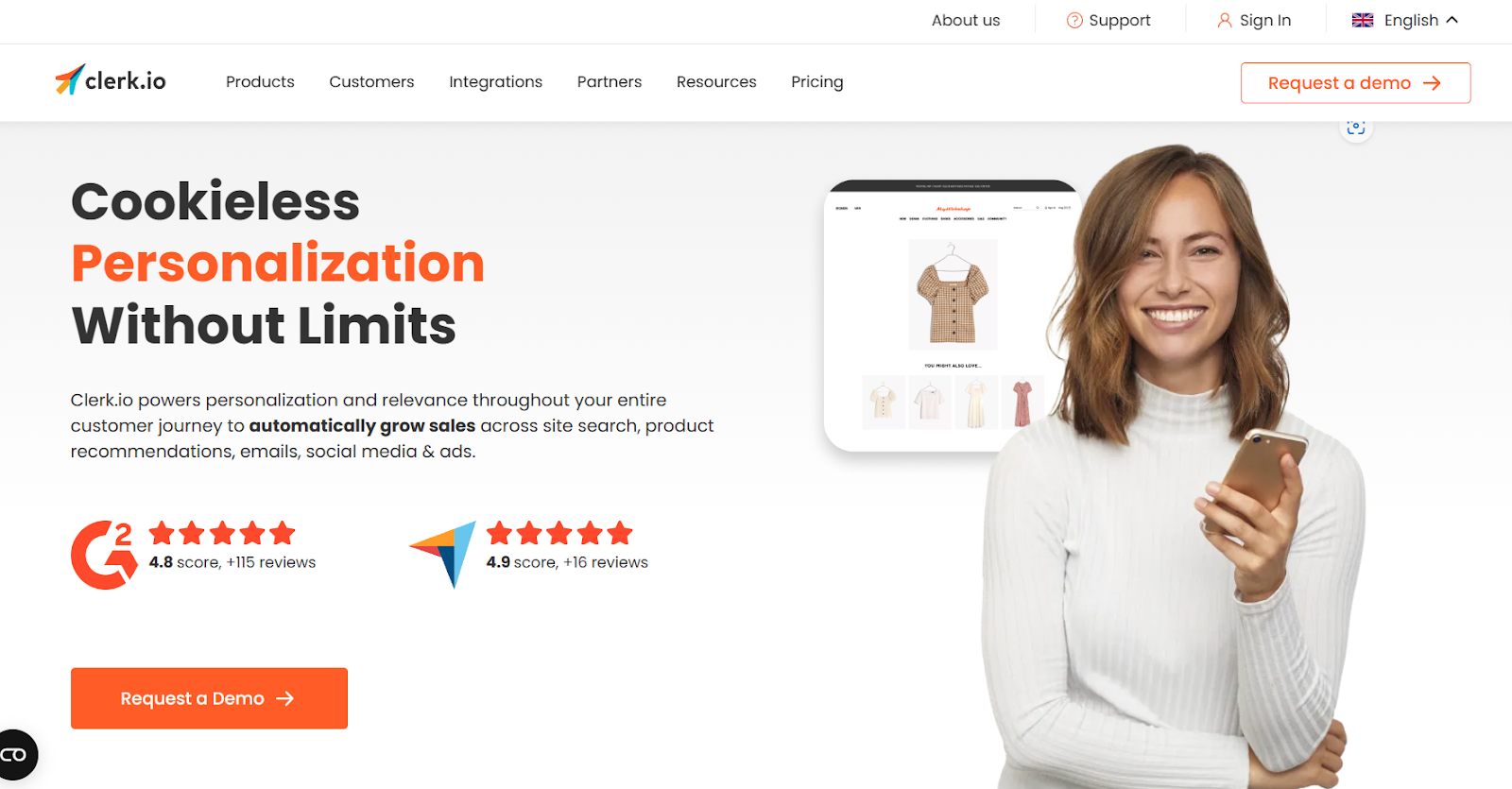
Clerk.io, while not claiming the throne of “best” product recommendation engine, has carved its niche by focusing on hyper-personalized recommendations and AI-powered optimization. Here’s what makes Clerk.io tick:
-
AI Muscle: At its core, Clerk.io boasts sophisticated AI algorithms that go beyond the classic “you bought X, try Y” logic. They delve deeper, considering a multitude of factors:
- Individual browsing behavior: Clicks, dwell time, and even abandoned cart items paint a detailed picture of your shopper’s needs.
- Product details: They consider attributes like brand, color, and even product descriptions to match recommendations like puzzle pieces.
- Shopper context: Location, demographics, and past interactions with Clerk.io-powered recommendations add another layer of personalization.
- Beyond Recommendations: Clerk.io isn’t just about showing products. They optimize the entire shopping experience:
- Dynamic Product Feed: Products adapt in real-time, showcasing the most relevant items for each individual as they browse.
- Predictive Merchandising: Clerk.io uses AI to predict popular products and place them prominently, ensuring prime visibility for the right items.
- Smart Search Filtering: Search results refine based on your browsing behavior, leading you to the perfect product faster.
-
Focus on Data and Performance: Clerk.io is all about measurable results:
- A/B Testing: Different recommendation layouts and strategies are tested to find the most effective ones for your audience.
- Detailed Analytics: You get deep insights into how your recommendations perform, track conversions, and identify areas for improvement.
- Constant Optimization: Clerk.io’s AI constantly learns and adapts, fine-tuning your recommendations over time for maximum impact.
- Global Reach and Expertise: Operating in over 80 countries, Clerk.io has access to a vast dataset of shopper behavior and market trends. This translates into refined algorithms that adapt to different cultures and shopping habits.
3. Emarsys Predict
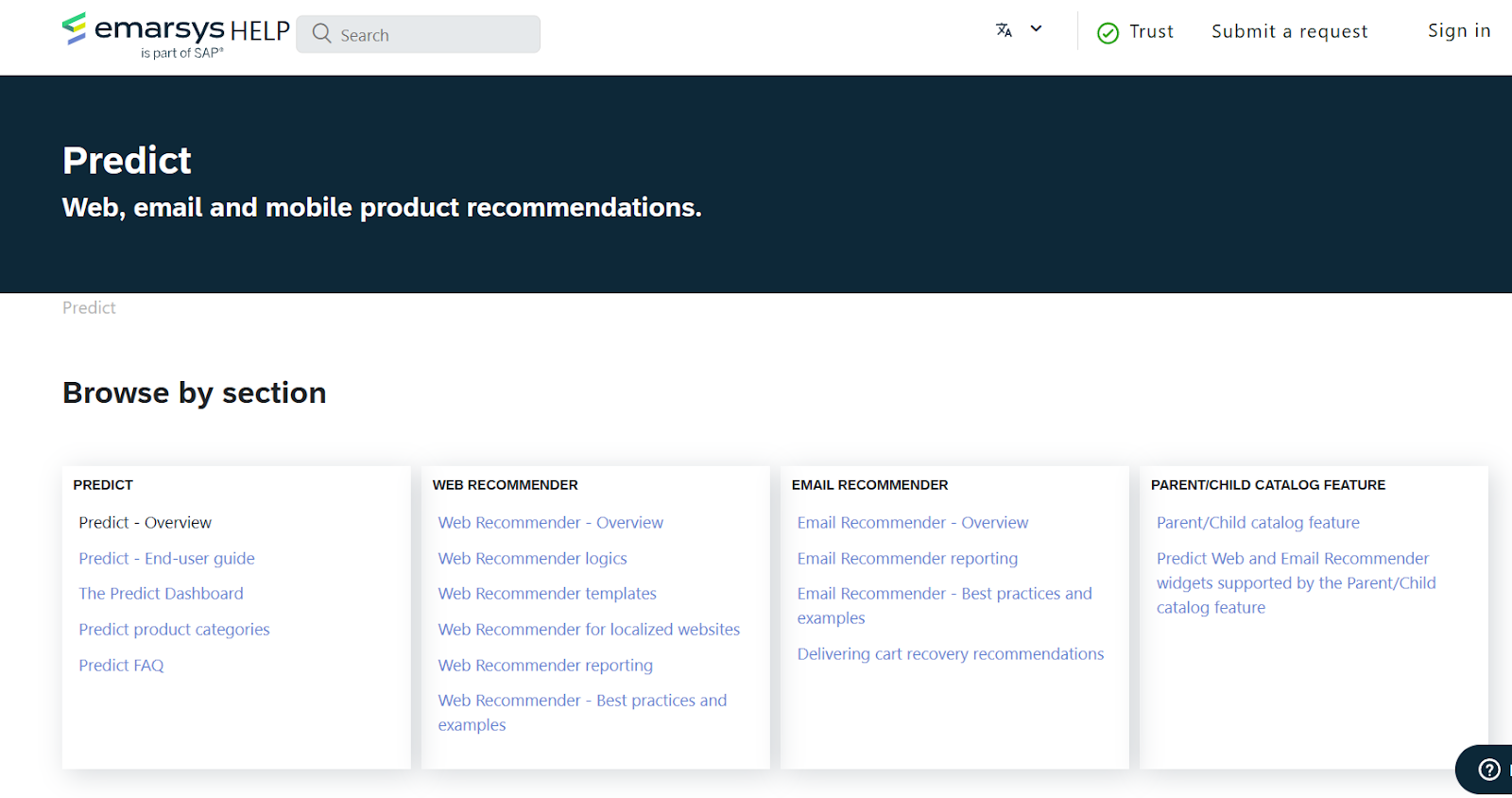
-
Emarsys Predict isn’t just a product recommendation engine, it’s a personalization powerhouse that delivers customized suggestions across your email, web, and mobile app interactions. Here’s what makes it tick:
-
Data-Driven Insights: Predict analyzes customer behavior data from all your channels, understanding what people browse, buy, and engage with. This deep understanding fuels its recommendations.
-
Stage-Specific Recommendations: Predict doesn’t offer one-size-fits-all suggestions. It tailors recommendations to specific buying stages: research & discovery, cart, purchase, and post-purchase. Imagine suggesting hiking backpacks to someone browsing outdoor gear, then recommending camping accessories after they buy the boots.
-
Channel Flexibility: Predict adapts to your chosen channel. On your website, it might display personalized product carousels or pop-ups. In emails, it can dynamically insert relevant recommendations within your campaigns. Even your mobile app can benefit from its tailored suggestions.
-
Multiple Recommendation Logics: Predict offers various “flavors” of recommendations, like:
- Content-based: Suggests similar products based on what you liked before.
- Collaborative filtering: Recommends what others with similar tastes enjoyed
- Hybrid filtering: Combines both approaches for extra personalization power.
- Focus on Results: Predict is data-driven, prioritizing measurable impact on conversions and engagement. You can track performance, A/B test different strategies, and constantly refine your recommendations for maximum effectiveness.
4. Nosto
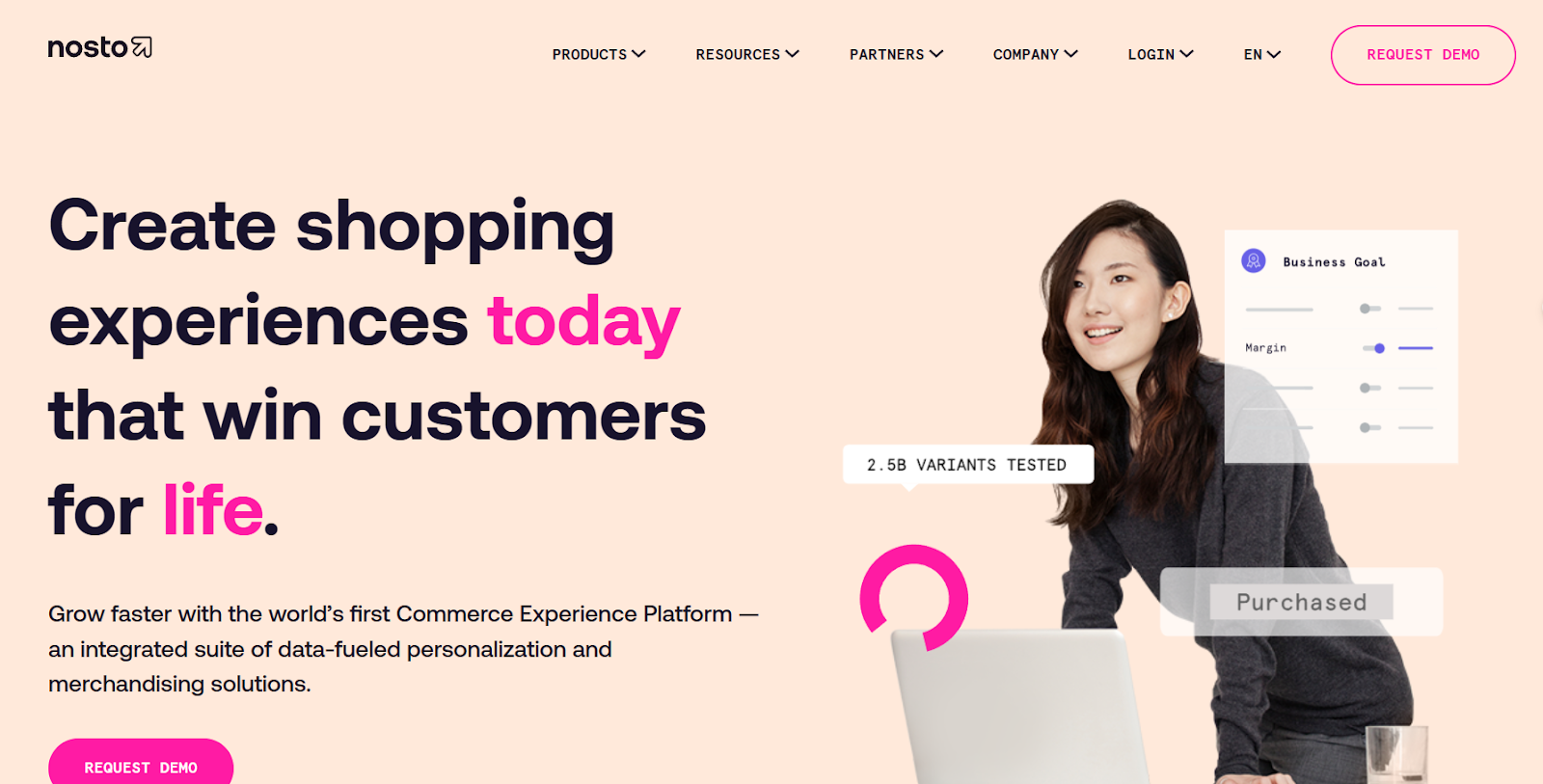
Nosto is a personalization powerhouse that combines real-time analysis with visual AI to suggest what shoppers truly crave. Here’s why Nosto stands out:
-
Reads Minds (Sort Of): Nosto analyzes every visitor’s activity, from clicks to dwell time, building a unique profile of their preferences. It goes beyond purchases, understanding motivations and intent.
-
Visual Intelligence: Nosto uses visual AI to understand product images and descriptions, creating even more precise recommendations. Think of it like having a fashion stylist who analyzes not just what you bought, but also the colors and styles you gravitate towards.
-
Real-Time Magic: Recommendations update as shoppers browse, reflecting their changing interests and needs. Imagine browsing shirts, then seeing complementary pants and shoes appear as you click on your favorite color.
- Beyond Recommendations: Nosto enhances the entire shopping experience with:
- Dynamic product layouts: Products rearrange based on individual preferences, highlighting the most relevant items.
- Personalized pop-ups: Targeted offers and suggestions appear at just the right moment, increasing engagement.
- Email marketing integration: Personalized product recommendations embedded in your emails for a seamless omnichannel experience.
- Data-Driven Optimization: Nosto is all about measurable results. You can track performance, A/B test different strategies, and analyze how recommendations impact conversions and revenue.
- Easy to Use: Nosto boasts a user-friendly interface, allowing you to customize recommendations and gain insights without needing technical expertise.
5. Qubit
Forget cookie-cutter recommendations, Qubit dives deep into personalized shopping experiences powered by AI’s brainiac, deep learning. Here’s why it stands out:
-
Customer-to-Product, Not Just the Other Way Around: Qubit flips the script. It focuses on understanding your customers – their preferences, past behaviors, even real-time browsing habits – to recommend products they’ll truly love. Think of it as a super-smart friend who suggests the perfect outfit based on your style, not just what others like.
-
Deep Learning Magic: Qubit isn’t just throwing darts, it uses Google Cloud AI’s powerful deep learning tech to continuously learn and adapt. The more you shop, the better it understands you, refining its recommendations like a constantly evolving fashion consultant.
-
Real-Time Tweaks: Recommendations aren’t static. Qubit adjusts its suggestions as you browse, in real-time! So if you switch from sneakers to boots, it doesn’t keep suggesting ballet flats. It’s like having a shopping buddy who changes their suggestions based on your every whim.
-
Beyond Product Pop-ups: Qubit offers more than just product recommendations. It can personalize your entire shopping experience with things like:
- Dynamic product layouts: Products rearrange themselves to highlight the most relevant items for you.
- Targeted campaigns and promotions: Offers and discounts tailored to your preferences, making them actually tempting.
- A/B testing and insights: Continuously test and refine your recommendations for maximum impact, like a scientist tinkering with the perfect potion.
How to choose the right Product Recommendation Engines?
Navigating the world of product recommendation engines can be like trying to find the perfect outfit in a crowded store. Don’t worry, we’ll help you pick the right fit for your business. Below are some key tips to keep in mind:
Know your priorities
- Personalization: Do you want recommendations that feel like a whispered suggestion from a best friend, or just general suggestions based on trends?
- Performance: Is boosting conversions and revenue your top concern, or are you more focused on customer engagement and understanding?
- Ease of use: Do you have a tech-savvy team, or need a platform with a drag-and-drop interface?
Consider your resources
- Budget: Engines range in price from affordable to enterprise-level investments.
- Technical expertise: Some require coding knowledge, while others are user-friendly for marketers.
- Data availability: The engine’s accuracy relies on your existing customer data, so assess its quality and quantity.
Explore the features
- Recommendation methods: Look for engines that offer a variety of algorithms, like collaborative filtering, content-based, or even AI-powered deep learning.
- Channel integration: Does the engine work seamlessly with your website, app, and other marketing channels?
- Analytics and reporting: Can you track the performance of your recommendations and adjust them for better results?
Ask the right questions
- Customization options: How much control do you have over the recommendations and their appearance?
- Integrations and partnerships: Does the engine work with other tools and platforms you use?
- Support and training: What kind of support is available to help you get the most out of the platform?
Final Words
In conclusion, along with marketing strategy, online merchant owners should pay attention to serving every customer best to make them feel being treated specially. Therefore, shop admins must have a supporting tool such as product recommendation engines. If you are looking for an extension that can meet all requirements for a good product recommendation engine, Mageplaza automatic related product extension is here waiting for you to experience its effectiveness.
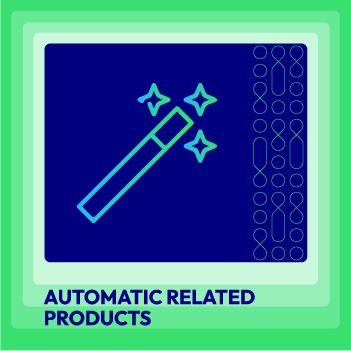
Automatic Related Products for M2
Encourage customers to add more items to their cart by showing related products alongside their favorites
Check it out!Related Posts:



